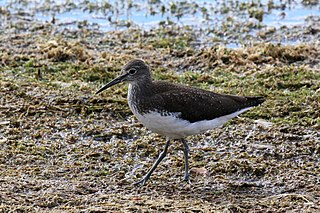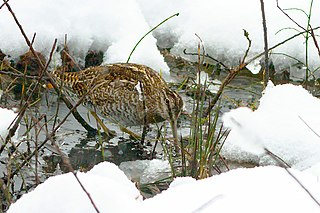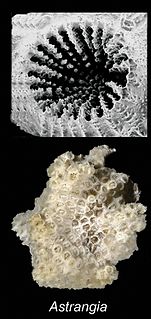
The green sandpiper is a small wader (shorebird) of the Old World.

The solitary sandpiper is a small shorebird. The genus name Tringa is the New Latin name given to the green sandpiper by Aldrovandus in 1599 based on Ancient Greek trungas, a thrush-sized, white-rumped, tail-bobbing wading bird mentioned by Aristotle. The specific solitaria is Latin for "solitary" from solus, "alone".

The African armyworm, also called okalombo, kommandowurm, or nutgrass armyworm, is a species of moth of the family Noctuidae. The larvae often exhibit marching behavior when traveling to feeding sites, leading to the common name "armyworm". The caterpillars exhibit density-dependent polyphenism where larvae raised in isolation are green, while those raised in groups are black. These phases are termed solitaria and gregaria, respectively. Gregaria caterpillars are considered very deleterious pests, capable of destroying entire crops in a matter of weeks. The larvae feed on all types of grasses, early stages of cereal crops, sugarcane, and occasionally on coconut. The solitaria caterpillars are less active and undergo much slower development. The species is commonly found in Africa, but can also be seen in Yemen, some Pacific islands, and parts of Australia. African armyworm outbreaks tend to be devastating for farmland and pasture in these areas, with the highest-density outbreaks occurring during the rainy season after periods of prolonged drought. During the long dry seasons ("off-season"), the population densities are very low and no outbreaks are seen.
Meleon is a genus of jumping spiders that was first described by F. R. Wanless in 1984.

The solitary snipe is a small stocky wader. It is found in the Palearctic from northeast Iran to Japan and Korea.
Centrolene solitaria is a species of frog in the family Centrolenidae. Known only from its type locality in Florencia, Caquetá, it is endemic to Colombia.

The rockwarbler, is a bird in the family Acanthizidae. It is the only bird species endemic to the state of New South Wales in Australia.
Aethiothemis solitaria is a species of dragonfly in the family Libellulidae. It is found in Angola, Botswana, Guinea, Guinea-Bissau, Namibia, Nigeria, Sierra Leone, Togo, Uganda, Zambia, possibly Malawi, and possibly Tanzania. Its natural habitats are subtropical or tropical moist lowland forests, dry savanna, moist savanna, subtropical or tropical dry shrubland, subtropical or tropical moist shrubland, swamps, and marshes.

Amanita echinocephala is a large, whitish or ivory-coloured mushroom with a characteristic spiny, or warty-looking cap. It lives on chalky soils with beech trees, and appears earlier than most mushrooms of similar size in southern England. It frequently occurs singly or in small groups, resulting in it being referred to as the solitary amanita or, more specifically, European solitary lepidella. It is very drought-tolerant. Amanita solitaria is a synonym and opinions are divided as to which name takes precedence.

Helvella solitaria is a species of fungus in the family Helvellaceae. Originally described as Peziza solitaria by Petter Karsten in 1869, he transferred it to the genus Helvella in 1871. The fungus has a boreal and temperate distribution.
Águila Solitaria is a Mexican Luchador enmascarado, or masked professional wrestler. Águila Solitaria's real name is not a matter of public record, as is often the case with masked wrestlers in Mexico where their private lives are kept a secret from the wrestling fans. His ring name, Águila Solitario, is Spanish for "Lone Eagle", which is reflected in the eagle wing design on his mask. Águila Soltaria made his professional wrestling debut in 1978 and since 1997 has only wrestled a limited schedule.
Mitromica solitaria is a species of small sea snail, marine gastropod mollusk in the family Costellariidae, the ribbed miters.
Aethiothemis carpenteri is a species of dragonfly in the family Libellulidae. It was originally described as Oxythemis carpenteri, named in honor of the collector of the type specimen, G. D. Hale Carpenter. The name is considered by some authorities to be a taxonomic synonym of Aethiothemis solitaria, though the taxonomy of the solitaria species complex is not clear.
Alopecosa solitaria is a wolf spider species in the genus Alopecosa found in Europe, Russia, and Kazakhstan.

Astrangia is a genus of stony corals in the family Rhizangiidae. Members of this genus are non-reef building corals and are found in the Atlantic and Indo-Pacific Oceans. They are solitary corals with large polyps and are found in clumps. They reproduce from stolons. The corallites are small with simple toothed septa.
Astrangia solitaria, the dwarf cup coral or southern cup coral, is a species of stony coral in the family Rhizangiidae. It is native to shallow water in the western Atlantic Ocean and the Caribbean Sea.

Argiocnemis rubescens is a species of damselfly in the family Coenagrionidae, commonly known as the red-tipped shadefly. It is a widespread species extending from India to southern China, south-east Asia, New Guinea and Australia.
Antennaria solitaria is a North American species of flowering plant in the daisy family known by the common name singlehead pussytoes. It is found in the southeastern and east-central part of the United States from Delaware and southern Pennsylvania west to southern Illinois and south as far as Georgia and Louisiana.

Episemasia solitaria is a species of geometrid moth in the family Geometridae. It is found in North America.
Heptagenia solitaria is a species of flatheaded mayfly in the family Heptageniidae. It is found in southwestern, northern Canada, and the western United States.










